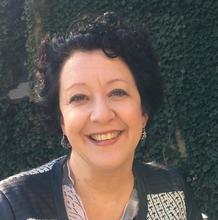
March 23, 2020
My dear students,
I greet you from the empty palace. Stiles College, where I live, stands quiet, and the stillness of this campus is stranger yet. From where I sit, I can see the buds of a dogwood tree beginning to open, and a few snowflakes are falling to complete a picture of the day – not even the land seems to know what season we are in.
In this quiet, I am imagining you. Perhaps you are sitting in a corner you have found for yourself in an apartment, or maybe that space is your bed, and your younger sibling is standing there waiting for your attention. Wherever you are, we are holding you close. This spring, ER&M will be a diaspora. Perhaps you can visualize us as a map constellated by dots of light – dense in some places, lighter in others. Wherever you are, we will be inventing ways to be connected – not only through Wi-Fi and phone, but by our shared wish to be back together as soon as possible.
You are no doubt experiencing profound unsettlement. I have been hearing from you, stories of caring for parents who are suddenly without a job, or of tending to the task of getting your households ready for who knows what. Of needing to find some kind of work, of calculating what it might mean to lose your own space and independence for a while. Seniors, you are wondering what kind of finish this is, after the intensity of four years. (Hang on, we will be celebrating you.) I have also heard from you about how challenging it feels to move learning online, learning, a profoundly social practice, now has to be mediated by unfamiliar, limited technologies. You are wondering what costs social separation might impose on all the ones you love and care for. And what is waiting for us all on the other side of this event.
This is a time of great vulnerability, and I wish only to say that we, the faculty and staff of ER&M are with you. We are committed to your learning and wellbeing. We will be improvising right along with you. We are prepared for the frustrations, the worry, and the limits of this technology. But I trust that we will also invent new ways to be social and to be scholars together. We might begin this week’s courses with simple affirmations of each other.
Most of all, we wish you and your loved ones to be well, to be safe as possible, and to be able to manage in these difficult circumstances. Our faculty has been in continuous conversation about our course plans and the concerns students have raised about making this spring term workable. The wonderful staff at ITS and the Poorvu Center for Teaching and Learning have been working tirelessly to make this transition possible. Tanja Cisija is holding our operations together. Ana Ramos-Zayas will keep you informed about resources, policies, and opportunities for other learning. I am here to listen and interested to know how we can make good of this time.
Disaster requires acts of imagination. The pandemic lays bare the cruelty of living in such dismal inequality. The minority in power may act savagely to make opportunistic use of the emergency. But emergency can be, and almost always is, a moment of emergence. You might look at the scenes of extraordinary care that ordinary people show one another; the spontaneous singing from balconies in Italy. In our neighboring town of Hamden, some of the residents ring bells at sunset to let each other know, we are all still here. Be well. Migrant-led organizations and labor unions are pressing for government relief to go to all workers and small business owners. For migrants in ICE custody to be released. Abolitionist organizations have called for decarceration. People are looking for ways to make food and medicines affordable. Here in New Haven, we are also looking for ways to protect vulnerable workers, the staff on contracts who clean the buildings, maintain grounds, and prepare our meals. People who won’t be eligible for government relief.
These are hard fights, but they become especially meaningful in the context of the emergency. They are works of imagination that can embolden the repressed, quieted social will for transformation. This enforced social separation may yet awaken a demand to be liberated from these other, imposed and unnatural forms of social separation: of class, of race, of legal status, of gender expression and sexuality, of religion and of place.
The writer Rebecca Solnit reminds us that “Disasters provide an extraordinary window into social desire and possibility, and what manifests there matters elsewhere, in ordinary times and in other extraordinary times.”
We don’t know yet what these times are, but I assure you, that your personal and collective desires, your plans and projects, your learning, matter. In this strange period of separation and absence, we celebrate you, we are with you. We are embarked on a moment of creative discovery – what is it we can be as a network, when we know how absolutely wonderful we are when we are all in one place?
With all respect and appreciation,
Alicia Schmidt Camacho